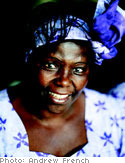Phenomenal Woman: Wangari Maathai

She's survived jail, beatings, and endless death threats to help topple a tyrant, save Kenya's forests, and bring hope to countless women and children. Judith Stone spends two awed and inspired days in the radiant presence of the first African woman to win the Nobel Peace Prize, Wangari Maathai.
As Wangari Maathai makes her way through the crowded halls of the United Nations headquarters in New York City, she causes a stir of rock-star proportions. The first African woman—and first environmentalist—to win the Nobel Peace Prize, she's come to take part in the UN Commission on the Status of Women, a gathering of more than 1,800 representatives from 165 countries. It's tough for Maathai, 65, to get from one meeting, lecture, or panel to another because she stops every two feet to embrace supporters. She's a notoriously terrific hugger. "So good," says her daughter, Wanjira, 33, who works with her mother, "that we once auctioned off one of her hugs to raise money for the Green Belt Movement."That's the organization Maathai launched in 1977, rallying poor, rural women to plant millions of trees to reverse the rampant deforestation of Kenya by a corrupt government. The women acquired not only desperately needed fuel, food, shelter, and income—the Green Belt Movement (GBM) pays a small fee for every seedling that flourishes—but a sense of their own untapped power. Other African nations followed Maathai's model. In nearly three decades, the GBM has planted more than 30 million trees and provided jobs for over 100,000 people, most of them women.
Along the way, through peaceful protests that captured world attention, the GBM opposed the despotic regime of Daniel arap Moi, Kenya's president from 1978 to 2002. Maathai was arrested, teargassed, clubbed senseless, whipped bloody, plagued by anonymous death threats, divorced by her husband for being, he declared, too educated and too hard to control, and denounced by Moi as a "threat to the order and security of the country." He was slightly off the mark. Maathai was very good for the order and security of the country, just very bad for him. Trees helped topple a dictator.
Giving the award to an environmentalist was controversial; one Norwegian politician complained that the committee should have focused on disarmament. Maathai believes they did. "When we have conflict, quite often it's because we're fighting over resources: who will control them, who will have access, who will take a greater share," she tells a gathering of dignitaries and environmental activists later in the day. The scarcer the resources—water, land, oil, trees, minerals—the greater the acrimony, she says.



